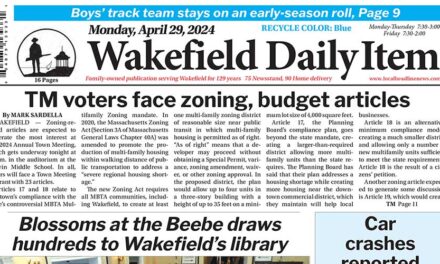By NEIL ZOLOT
NORTH READING — The School Department presented a modified budget to the School Committee for Fiscal Year 2025 of $40,333,446, which is 8.1% higher than the current FY24 allocation of $37,319,595 at its annual school budget public hearing Monday, April 8.
Although the modified budget is nearly one percent lower than the department’s initial FY25 proposal of $40,679,524 made in March, it still leaves a deficit of $1,561,318 between proposed expenses and revenue. The $346,078 budget reduction was achieved in part by eliminating four new previously proposed positions.
Nevertheless, School Committee Chairman Scott Buckley warned, “There’s no guarantee about what we will or won’t get.”
There are two other choices, as presented by Superintendent Dr. Patrick Daly and Assistant Superintendent for Finance and Operations Michael Connelly. These are a balanced budget of $38,772,128, which is 3.9% higher than FY24 but with no gap between expenses and revenue, and a level services budget of $39,972,635, which is 7.1% higher than FY24.
Although the level services budget leaves a shortfall of $1,200,507, it meets current level service needs and includes the addition of 2.4 FTE elementary-level staff due to increased enrollment as well as contractual obligations and fixed cost increases. This budget does not reduce existing staff or current educational services, but it also does not add new staffing for mental health and academic support systems and it continues the tuition-based full-day kindergarten program of $2,500 per student. The half-day program is free; the tuition covers the additional hours of services provided to students who attend a full day of school.
Two budgets to be presented to voters
“The goal will be to have two budgets presented at Town Meeting,” Buckley said in reference to the balanced budget and the School Department’s latest proposal. “If an override passes, we’ll know what will be saved.”
In a presentation resembling the one he gave at the March 11 meeting, Connelly went over budget pressures, including wanting to retain four positions costing $213,000 formerly funded through Elementary and Secondary School Emergency Relief (ESSER) aid allocated due to the pandemic, and the $200,000 cost of providing free full-day kindergarten.
North Reading is one of only 15 communities in the state that imposes tuition for full-day kindergarten. In accordance with School Committee and School Department desires to provide free or less expensive full-day kindergarten, tuition has dropped from $4,250 in FY21 to $2,500 in FY24.
At the same time Circuit Breaker Special Education aid is dropping 2/10ths of one percent, totaling $75,679 based on expenses in FY24, while the cost of providing in-district SPED services and out-of-district tuition is going up.
Daly pointed out that North Reading also faces potential losses in federal Title 1 funding because of the town’s low overall poverty rate. Title 1 assists districts with high numbers of children from low-income families. “It’s a challenge to balance a budget with limited resources, but every year we find ways to, often at the expenses of advancing education,” he said. “Every year everyone works to provide the best education for our children with limited resources.”
Salaries are nearly 83% of budget
“We have fixed costs we can’t avoid,” Connelly explained. “That will always be the case. Nothing is getting cheaper. Building maintenance and transportation costs go up. The reality of a school budget is there’s only 3% in discretionary spending because so much of it is fixed.”
Salaries represent $33,733,805 of the latest budget, which is the same number as the initial budget proposal but $2,799,217 higher than the current fiscal year. Salaries consume 82.9% of the budget. Buckley noted despite the increase that percentage is similar to previous budgets.
“Cost of living increases align with the market,” Daly added.
Various principals and administrators including Director of Student Services Cynthia Conant, High School Principal Anthony Loprete and Hood School Principal Dr. Glen McKay told the committee about the short- and long-term implications of decreases in funding, including class sizes being larger than optimum levels for learning, fewer course offerings at the High School, less money for school materials, less money for unforeseen building maintenance needs and equipment replacement, a reduction in nursing services, less staff working on academic support and early intervention for students, and possible increases in fees for playing sports, transportation and tuition-based programs.
Their comments were preceded by an explanation from Daly as to what school adjustment counselors, guidance counselors and psychologists do in providing academic and social and emotional support for students.
“Support for students will change in an underfunded budget,” Loprete said.
“To lose positions that are now regarded as essential is sobering,” School Committee member Noelle Rudloff reacted, referring to the positions previously funded through ESSER aid.





